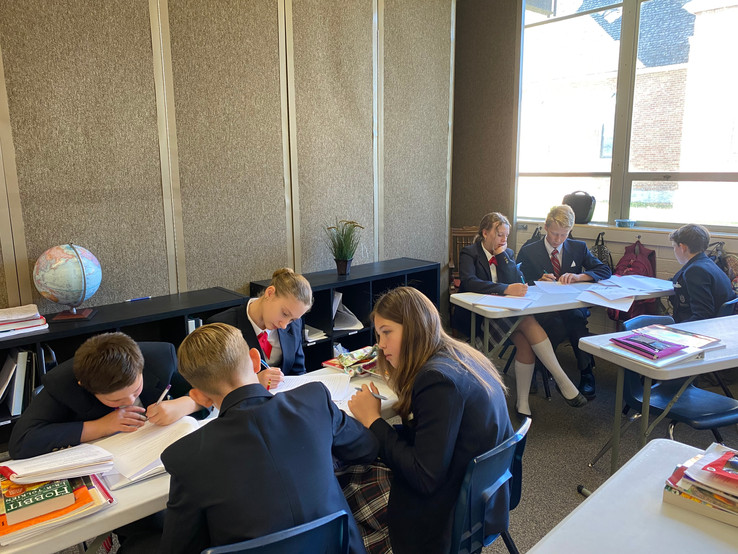September 22 has been declared “Hobbit Day” by the American Tolkien Society, and the middle school has been studying The Hobbit in literature class. As a result, our upper school had a day of celebration in honor of Tolkien. The day began with our all-school devotional, led by our founders Mr. and Mrs. Carman, during which time the Middle School students recited by memory the "Dwarves’ Song" from The Hobbit. Students learned this song with Mrs. Cortney Wright, their literature teacher:
Far over the misty mountains cold
To dungeons deep and caverns old
We must away ere break of day
To seek the pale enchanted gold.
The dwarves of yore made mighty spells,
While hammers fell like ringing bells
In places deep, where dark things sleep,
In hollow halls beneath the fells.
For ancient king and elvish lord
There many a gleaming golden hoard
They shaped and wrought, and light they caught
To hide in gems on hilt of sword.
On silver necklaces they strung
The flowering stars, on crowns they hung
The dragon-fire, in twisted wire
They meshed the light of moon and sun.
Far over the misty mountains cold
To dungeons deep and caverns old
We must away, ere break of day,
To claim our long-forgotten gold.
Goblets they carved there for themselves
And harps of gold; where no man delves
There lay they long, and many a song
Was sung unheard by men or elves.
The pines were roaring on the height,
The winds were moaning in the night.
The fire was red, it flaming spread;
The trees like torches blazed with light.
The bells were ringing in the dale
And men they looked up with faces pale;
The dragon’s ire more fierce than fire
Laid low their towers and houses frail.
The mountain smoked beneath the moon;
The dwarves they heard the tramp of doom.
They fled their hall to dying fall
Beneath his feet, beneath the moon.
Far over the misty mountains grim
To dungeons deep and caverns dim
We must away, ere break of day,
To win our harps and gold from him!
The beauty of Tolkien’s literature and the joy of the Christian life was a theme of our Thursday devotional. In addition to penning some of the greatest works of twentieth-century literature, Tolkien was also friends with C.S. Lewis, the author of The Chronicles of Narnia and a famous Christian convert. Not only is Lewis another author present in our curriculum, but he is an example of someone whose life was changed and given great joy because of his conversion to Christianity. The friendship between Tolkien and Lewis was discussed by Mr. Carman. The students were also invited to ponder the beauty of God’s creation and the way that beauty leads us to God Himself. Beginning with the beautiful, we are led to the good and then to the true. God indeed speaks to us through the beautiful, including beautiful literature written by authors like Tolkien and Lewis.
The students read aloud the following reflection written by Mrs. Cortney Wright during devotional. The reflection was an opportunity for students to again reflect on a theme in The Hobbit and consider the way that this book relates to the Christian faith:
This is the story of how a Baggins had an adventure, and found himself doing and saying things altogether unexpected.” J.R.R. Tolkien’s classic novel, The Hobbit, tells the story of Bilbo Baggins, a hobbit living in his comfortable hobbit hole, who had “no use for adventures” because they are “nasty, uncomfortable things” that “make you late for dinner.” However, Gandalf, the wandering wizard, had other plans for Bilbo. Bilbo was to be a Burglar on a prophetic adventure.
Despite the complaints of Bilbo and some skeptical dwarves, Gandalf asserted, “I have chosen Mr. Baggins and that ought to be enough for all of you. If I say he is a Burglar, a Burglar he is, or will be when the time comes. There is a lot more in him than you guess, and a deal more than he has any idea of himself. I brought him, and I don't bring things that are of no use."
Bilbo was not yet a Burglar, and he had never even considered being a Burglar. Yet, he heeded Gandalf’s urging and joined the journey, leaving his luxuriously immovable hobbit-hole behind.
Bilbo “found himself outside, without a hat, a walking-stick or any money, or anything that he usually took when he went out,” just the promise of “one fourteenth of total profits (if any); all traveling expenses guaranteed in any event; [and] funeral expenses to be defrayed.” He was willing to submit, “pushing his keys [to his home] into Gandalf’s hands.”
Gandalf, knowing what comforts Bilbo was forgoing, surprised him with all the things Bilbo thought he had left behind- “a lot of pocket-handkerchiefs, and Bilbo’s pipe, and tobacco.”
Just as Gandalf saw Bilbo’s potential, God’s infinitely moral imagination sees our potential. Just as Gandalf compelled Bilbo to leave the creature comforts of his family hobbit-hole to undertake an unexpected journey, God lovingly provides us with surprising, and often uncomfortable, opportunities for growth, leading us far from familiar places and far into regions where we can become more fully ourselves.
And yet, God, like Gandalf, never leaves us comfortless. The Old Testament reminds us that when God asks us to leave what we have known, He provides promises. He gave Adam clothes when he was cast out of the garden, He gave Noah an ark to face a flood, and when Abram was commanded to leave his father’s house, God gave him a nation. After they chose the unexpected journey, God fulfilled His promises.
Bilbo crossed mountains, and in doing so, was surprised to realize he “had a hand” in bringing to pass “the prophecies of the old songs.” God asks us to do the same today. How beautiful upon the mountains are the feet of him that bringeth good tidings, that publisheth peace; that bringeth good tidings of good, that publisheth salvation; that saith unto Zion, Thy God reigneth!”
After devotional, the students started their day of learning. In addition to a normal day of studies, however, they were also given a special treat. Throughout the day, the students ate like little hobbits, enjoying Second Breakfast (9am), Elevenses (11am), Luncheon (1pm), and an Afternoon Snack (2:30pm). They also enjoyed some games during lunchtime.
By Darrell Falconburg
***
Darrell Falconburg teaches Western heritage, geography, civics, and logic at Belmont Classical Academy.
Cortney Wright teaches Classical Composition, Literature, Grammar, Spelling, French, and Bible Study at Belmont Classical Academy, and is co-author of the phonics-based Classical Spelling Method.
















コメント